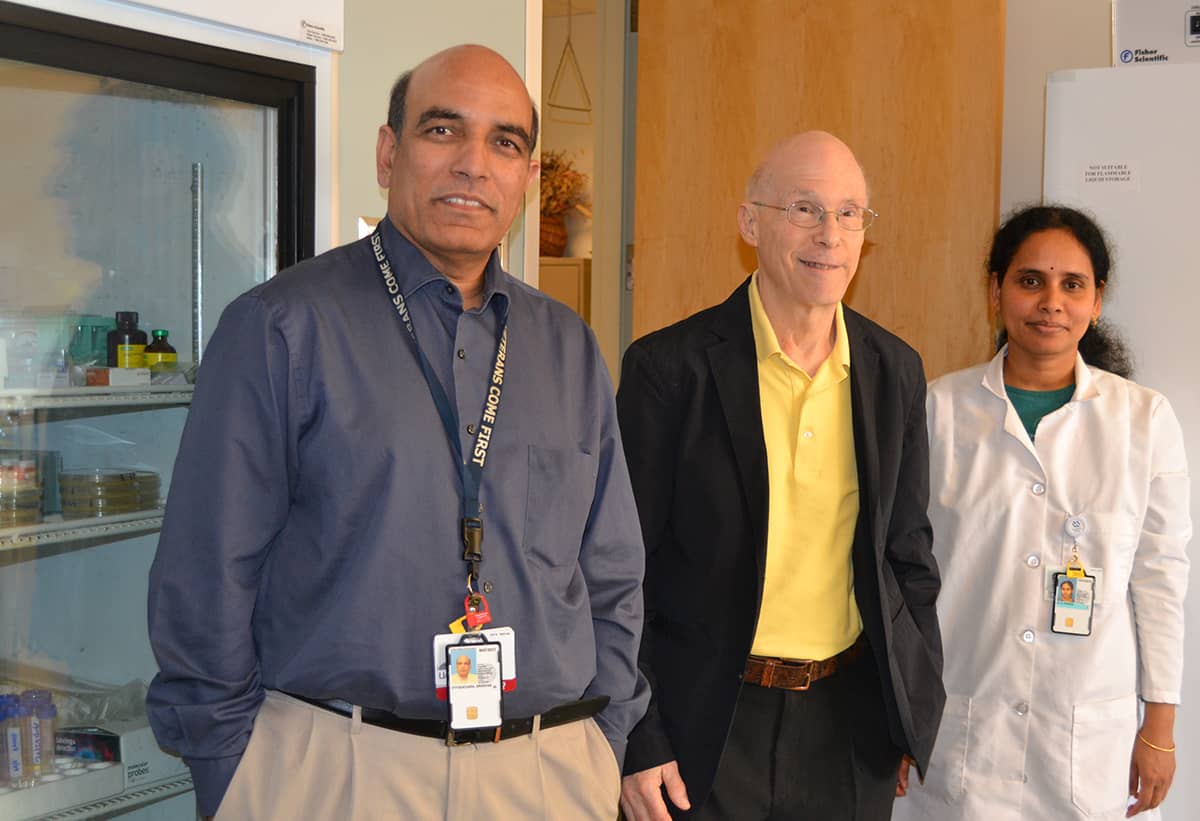UAMS Researchers Receive $1.8 Million to Study Common Mechanisms Shared by Alzheimer’s, Other Diseases
| A team of University of Arkansas for Medical Sciences (UAMS) research scientists recently was awarded a $1.8 million, five-year grant by the National Institute on Aging to investigate common pathways that contribute to the aging of various tissues.
Robert Shmookler Reis, D. Phil, professor in the UAMS College of Medicine’s Donald W. Reynolds Department of Geriatrics, and Srinivas Ayyadevara, associate professor in same department, are the co-principal investigators leading the study. Co-investigators are Steve Barger, Ph.D., professor in the Departments of Geriatrics and Neurobiology & Developmental Sciences, and Alan Tackett, professor in the Department of Biochemistry & Molecular Biology.
The goal of the research is to identify what different neurodegenerative diseases like Alzheimer’s disease have in common with other age-progressive diseases and conditions such as heart disease, muscle wasting, kidney disease, and type 2 diabetes.
Protein aggregation — clustering or clumping of protein molecules — has long been recognized as a hallmark of neurodegenerative diseases like Alzheimer’s and Parkinson’s.
“We were the first ones to show that protein aggregation happens not just in the brain, but also in the heart, skeletal muscle and kidney with age and age-associated diseases,” Ayyadevara said. Reis added, “The misfolding of proteins, which contributes to protein aggregation, is promoted by stress and inflammation, accumulating with age.”
Reis said the team has looked at protein aggregation for nearly a decade, funded by grants from the U.S. Department of Veteran Affairs. For the last two years, it has also been supported as part of a multi-investigator National Institutes of Health (NIH) grant led by Sue Griffin, Ph.D., professor and vice chair of research at the UAMS Donald W. Reynolds Institute on Aging. Peter Crooks, Ph.D., D.Sc., chair and professor of the Department of Pharmaceutical Sciences in the UAMS College of Pharmacy, developed novel derivatives of anti-inflammatory drugs.
As part of the NIH grant, Crooks, Reis, Ayyadevara, and graduate student Samuel Kakraba tested these drugs for their ability to inhibit protein aggregation and to extend life. One drug, PNR502, was the main subject of a recently awarded patent covering several bioactive compounds.
“It not only inhibits further protein aggregation but even appears to reverse it,” Ayyadevara said. “Working with Dr. Barger, we will examine whether it can preserve youthful functions in the hearts and brains of normal mice, and in a mouse model of Alzheimer’s.”
“We have shown that protein aggregation accompanies aging of all tissues, and probably contributes causally to most or all age-associated diseases,” said Reis. “This fundamental molecular process may underlie most of the deterioration that defines aging. It’s a Pandora’s box that holds all the things that go wrong as we get older, so it offers an unprecedented opportunity to finally understand how and why so many disparate factors contribute to aging.”
UAMS is the state’s only health sciences university, with colleges of Medicine, Nursing, Pharmacy, Health Professions and Public Health; a graduate school; a hospital; a main campus in Little Rock; a Northwest Arkansas regional campus in Fayetteville; a statewide network of regional campuses; and eight institutes: the Winthrop P. Rockefeller Cancer Institute, Jackson T. Stephens Spine & Neurosciences Institute, Harvey & Bernice Jones Eye Institute, Psychiatric Research Institute, Donald W. Reynolds Institute on Aging, Translational Research Institute, Institute for Digital Health & Innovation and the Institute for Community Health Innovation. UAMS includes UAMS Health, a statewide health system that encompasses all of UAMS’ clinical enterprise. UAMS is the only adult Level 1 trauma center in the state. UAMS has 3,485 students, 915 medical residents and fellows, and seven dental residents. It is the state’s largest public employer with more than 11,000 employees, including 1,200 physicians who provide care to patients at UAMS, its regional campuses, Arkansas Children’s, the VA Medical Center and Baptist Health. Visit www.uams.edu or uamshealth.com. Find us on Facebook, X (formerly Twitter), YouTube or Instagram.###
